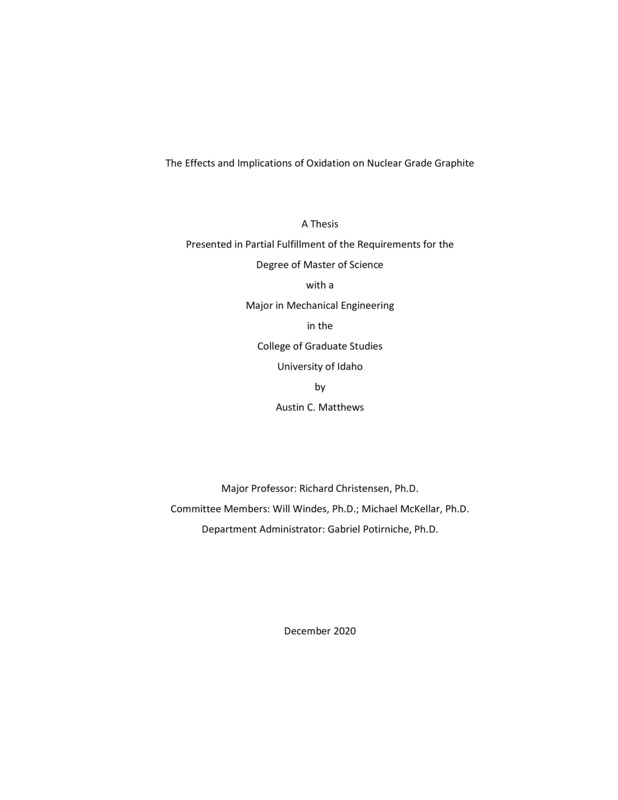The Effects and Implications of Oxidation on Nuclear Grade Graphite
Matthews, Austin. (2020-12). The Effects and Implications of Oxidation on Nuclear Grade Graphite. Theses and Dissertations Collection, University of Idaho Library Digital Collections. https://www.lib.uidaho.edu/digital/etd/items/matthews_idaho_0089n_12008.html
- Title:
- The Effects and Implications of Oxidation on Nuclear Grade Graphite
- Author:
- Matthews, Austin
- ORCID:
- 303806598
- Date:
- 2020-12
- Program:
- Mechanical Engineering
- Subject Category:
- Mechanical engineering; Materials Science; Nuclear engineering
- Abstract:
-
Graphite is an important and often life-limiting component for reactors. It is used as a structural and moderating material in both research and commercial high-temperature gas cooled reactor designs. Prior to use in a reactor, the physical, mechanical, and thermal properties of the selected graphite grade must be assessed to evaluate the in-service performance over the life of the component. While graphite is inherently stable in the inert environment of a helium-cooled reactor during normal operations (anticipated 400–1000°C core temperature), graphite is susceptible to rapid oxidation when exposed to oxidizing conditions at these operating temperatures. The concern with oxidation is its impact on the physical, mechanical, and thermal properties of graphite. Changes to the structural integrity of the core components is the most critical issue for reactors, meaning the changes in mechanical strength of graphite must be determined for a variety of oxidizing conditions. Also critical is the impact of oxidation on physical and thermal properties, a decrease in the density of graphite due to oxidation for example will decrease neutron moderation. Additionally, the rate of heat removal from fuel will be impacted as the thermal diffusivity will decrease with oxidation.The strength behavior of fine- and medium-grain nuclear graphite grades are examined following exposure to varying oxidizing conditions within the kinetic regime as defined by the ASTM oxidation test standard 7542. This study addresses the critical licensing issue of remaining oxidized strength of graphite core components after oxidized mass losses up to and beyond the current limits recommended within the ASME Boiler and Pressure Vessel (BPV) code (implied maximum mass loss = 10%) over a range of oxidation temperatures from 550°C to 750°C. Preliminary results generally demonstrate that low-temperature oxidation can result in 30% greater strength reductions than is seen during oxidation at higher temperatures with similar mass-loss levels. These results have implications in the way the ASME BPV code is currently interpreted, as there is no provision for the oxidizing conditions which were found to have a significant effect on the strength of graphite after oxidation. Property changes of fine- and medium-grain nuclear graphite grades are examined after subjection to uniform oxidation conditions within the kinetic regime as defined by the ASTM oxidation test standard 7542. This study addresses the underlying physical property changes of nuclear-graphite components for oxidized mass losses beyond the current limits recommended for graphite components in the ASME code. Property measurements include density, elastic modulus, shear modulus, coefficient of thermal expansion, electrical resistivity, and thermal diffusivity. Results demonstrate a decrease in elastic modulus and thermal diffusivity, and an increase in electrical resistivity and coefficient of thermal expansion with increasing oxidation mass loss. The decrease in coefficient of thermal expansion contradicts previous work due to differing oxidation regimes and highlights a need for clarity in the ASME Boiler and Pressure Vessel code on the way oxidation occurs.
- Description:
- masters, M.S., Mechanical Engineering -- University of Idaho - College of Graduate Studies, 2020-12
- Major Professor:
- Christensen, Richard
- Committee:
- Windes, William; McKellar, Michael
- Defense Date:
- 2020-12
- Identifier:
- Matthews_idaho_0089N_12008
- Type:
- Text
- Format Original:
- Format:
- application/pdf
- Rights:
- In Copyright - Educational Use Permitted. For more information, please contact University of Idaho Library Special Collections and Archives Department at libspec@uidaho.edu.
- Standardized Rights:
- http://rightsstatements.org/vocab/InC-EDU/1.0/

